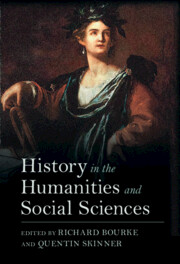Book contents
- History in the Humanities and Social Sciences
- History in the Humanities and Social Sciences
- Copyright page
- Contents
- Figures
- Contributors
- Acknowledgements
- Introduction
- 1 Law and History, History and Law
- 2 History, Law and the Rediscovery of Social Theory
- 3 The Uses of History in the Study of International Politics
- 4 International Relations Theory and Modern International Order: The Case of Refugees
- 5 The Delphi Syndrome: Using History in the Social Sciences
- 6 Power in Narrative and Narratives of Power in Historical Sociology
- 7 History and Normativity in Political Theory: The Case of Rawls
- 8 Political Philosophy and the Uses of History
- 9 The Relationship between Philosophy and its History
- 10 When Reason Does Not See You: Feminism at the Intersection of History and Philosophy
- 11 On (Lost and Found) Analytical History in Political Science
- 12 Making History: Poetry and Prosopopoeia
- 13 Reloading the British Romantic Canon: The Historical Editing of Literary Texts
- 14 Economics and History: Analysing Serfdom
- 15 The Return of Depression Economics: Paul Krugman and the Twenty-First-Century Crisis of American Democracy
- 16 Anthropology and the Turn to History
- Index
- References
6 - Power in Narrative and Narratives of Power in Historical Sociology
Published online by Cambridge University Press: 08 December 2022
- History in the Humanities and Social Sciences
- History in the Humanities and Social Sciences
- Copyright page
- Contents
- Figures
- Contributors
- Acknowledgements
- Introduction
- 1 Law and History, History and Law
- 2 History, Law and the Rediscovery of Social Theory
- 3 The Uses of History in the Study of International Politics
- 4 International Relations Theory and Modern International Order: The Case of Refugees
- 5 The Delphi Syndrome: Using History in the Social Sciences
- 6 Power in Narrative and Narratives of Power in Historical Sociology
- 7 History and Normativity in Political Theory: The Case of Rawls
- 8 Political Philosophy and the Uses of History
- 9 The Relationship between Philosophy and its History
- 10 When Reason Does Not See You: Feminism at the Intersection of History and Philosophy
- 11 On (Lost and Found) Analytical History in Political Science
- 12 Making History: Poetry and Prosopopoeia
- 13 Reloading the British Romantic Canon: The Historical Editing of Literary Texts
- 14 Economics and History: Analysing Serfdom
- 15 The Return of Depression Economics: Paul Krugman and the Twenty-First-Century Crisis of American Democracy
- 16 Anthropology and the Turn to History
- Index
- References
Summary
Sociologists often construct historical narratives to support their arguments. But how do they utilize history? The most common approach is to draw on facts from the past to develop and test causal hypotheses. Sociologists employ their theoretical knowledge and historical research to determine the power that drives the narrative forward. This is usually a structural variable: class, culture, social identity groups, state institutions, geopolitics, or a combination thereof. However, the continuing diffusion of power in society has strained this method to the limit. One alternative is to substitute scholarly conceptions of power for the way social actors practically understand and exercise power. After all, power is nothing but relational. Historical sociologists can weave together these everyday narratives of power to reveal how rather than why people behave the way they do. This requires cultivating an empathetic sensibility to understand other people’s experiences, and a literary skill to vividly re-enact their situations. The chapter traces the lineage of this method from Clausewitz and Tocqueville to contemporary sociologists, such as Andrew Abbot, Pierre Bourdieu, and Robert Nisbet. It encourages a scholarly disposition that embraces social complexity rather than settle for the simplification of overarching processes and structural factors.
- Type
- Chapter
- Information
- History in the Humanities and Social Sciences , pp. 141 - 164Publisher: Cambridge University PressPrint publication year: 2022
References
- 12
- Cited by

